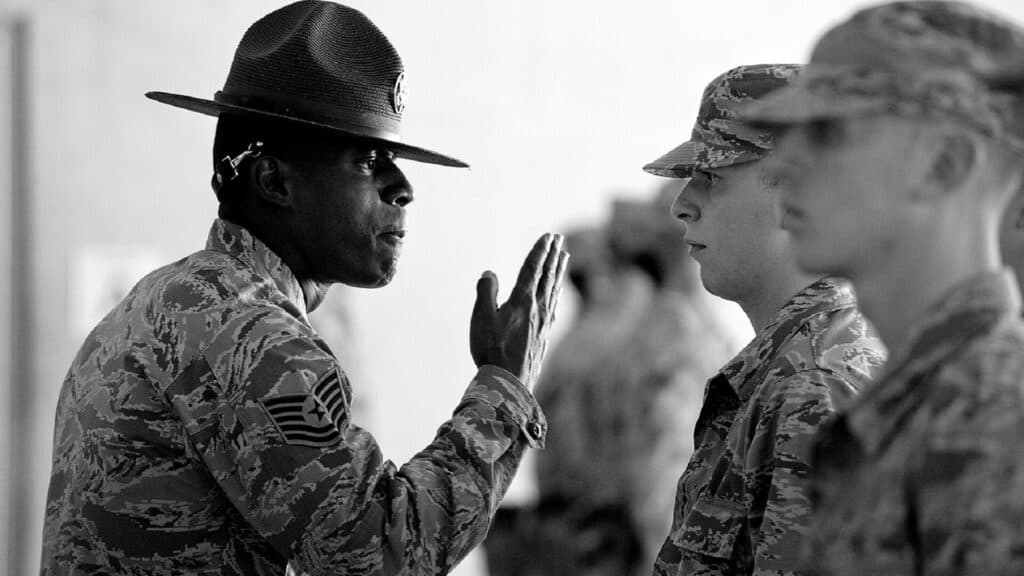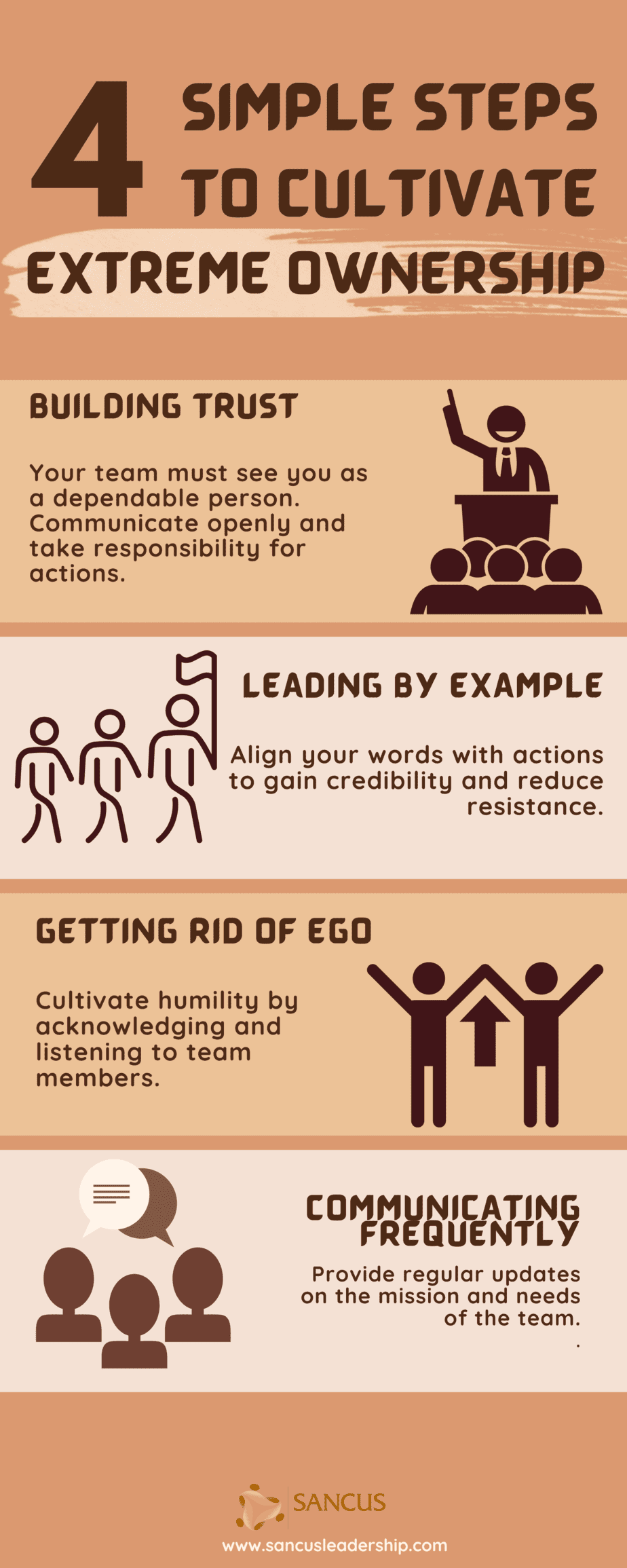Leaders who take responsibility for every success and failure they encounter in their mission are more likely to succeed than those who give excuses and blame others. Jocko Willink and Leif Babin’s Extreme Ownership leadership style best summarizes this statement. So what are the most important lessons to learn from extreme ownership?
One important lesson from extreme ownership is that a leader’s mindset influences success. Although successful leaders delegate power, they are always accountable for everyone’s actions. They don’t look for excuses for bad performance but instead come up with solutions.
This article discusses all lessons you can steal from Jocko Willink and Leif Babin’s Extreme Ownership book.
Extreme Ownership Summary

Leading a business is like going into combat with a troop following your lead, except you don’t have to kill anyone (unless you are mafia, I guess). That’s what Jocko Willink and Leif Babin demonstrate in their book Extreme Ownership.
Both are retired Navy SEALs. They share the lessons they gained on the battlefield for over 30 years to empower organization leaders. Most importantly, they borrow extreme ownership principles from leading SEAL’s Task Unit Bruiser in the violent battles of Ramadi, Iraq.
Are you a manager? Here are signs to look for that you are not taking extreme ownership!
Although I wasn’t in Iraq during the same period as them, witnessing the aftermath of those battles makes me think everyone who survived must have plenty of important lessons to teach. So I am all ears (or eyes) when they talk.
Their ability to manage the team under pressure and to make decisions in split seconds helped them secure the city. Mark you, it does not mean there were no mistakes. In fact, in one instance, a soldier lost their life while engaging in combat with a friendly group (something we refer to as “blue on blue”).
Despite Jocko Willink making a grave mistake that cost another’s life and injuries to other soldiers, his seniors did not dismiss him or terminate his career. Instead, he continued to serve in his position.
Why? Because he took responsibility for the mistake as the unit commander without blaming others. Also, he reviewed the standard operating procedures to prevent the mistake from being repeated. By doing so, his superior believed he had what it takes to lead the team.
Overall, extreme ownership emphasizes that a leader should be accountable for the failure and success of the business. This sets the pace for the subordinates while creating efficiency in the team.
If you want to own a copy, you can check the book on Amazon: Extreme Ownership: How U.S. Navy SEALs Lead and Win.
The 13 Principles of Extreme Ownership

Every leader wants to manage a winning team. And if you’re wondering how you can lead your team to success, there are several lessons you can borrow from extreme ownership.
| Principles of Extreme Ownership | Description |
| A Leader’s Mindset Is Key to Success | A leader should have an extreme ownership mindset that requires them to take responsibility for their actions and those of their team. |
| Leading Requires Accountability | A leader must hold themselves and their team accountable for success and failure. They must ensure the team understands the mission and provide the necessary resources and support to achieve it. |
| Teams Are Always a Reflection of Their Leader | A leader’s actions directly influence employees’ morale, and they must lead by example to create a positive work environment. |
| You Can Only Lead From a Place of Clarity | A leader must have a clear understanding of the mission, the strategies required to achieve it, and why it matters to communicate it effectively to the team. |
| The Mission’s Success Should Override Personal Interests | A leader’s ego should not dominate their drive for success, as it can lead to dismissiveness, lack of accountability, and blaming others for failure. |
| Teamwork Requires Proper Coordination | Effective teamwork requires proper coordination and communication to avoid competition, blame games, and resentment. |
| Simplifying Orders and Plans Avoids Confusion | A leader must simplify orders and plans to ensure everyone understands them and has a clear picture of what’s expected of them. |
| Pressuring Situations Require a Leader To Set Priorities | During a crisis, a leader must prioritize avoiding the worst outcomes and make quick, informed decisions to restore order. |
| Sharing Power Propels Success | A leader should share power and responsibilities with their team to increase their chances of success and build a team of leaders beneath them. |
| Plan Before Implementing | Planning helps leaders prepare necessary resources, identify challenges, and chart organizational goals and activities to execute the plan effectively. |
| Discipline Brings Freedom and Flexibility | Leaders who cultivate discipline can stay focused on what matters and follow a routine or structure to be more efficient and flexible. |
| Leading Requires Prompt Decision Making | Leaders must be quick at making decisions with little information and no time and adjust them as necessary to serve the organization’s interests. |
| Anticipate Threats | Leaders must continuously train themselves and their teams to improve their skills and adapt to new challenges and environments. |
1. A Leader’s Mindset Is Key to Success

Leading a winning team starts from a leader’s mind. Leaders must cultivate beliefs and attitudes that govern how they conduct themselves and interact with others.
An extreme ownership mindset requires the leader to look from the inside out. The leader should know they are responsible for their actions and the actions of their juniors.
When disruptions occur in the business, as they inevitably do, a leader should always find ways of changing the course for better results—even if they are not directly responsible.
An extreme ownership mindset empowers the leader to act without excuses. Cultivating this attitude calls for a balance between humility and confidence.
An extreme ownership mindset empowers the leader to act without excuses. Cultivating this attitude calls for a balance between humility and confidence.
You should be willing to accept your shortcomings and appreciate everyone’s opinion irrespective of their position, yet lead with authority and firmness.
2. Leading Requires Accountability
Accountability is a muscle that every leader needs to develop over time. It’s easy to take the glory of a successful project, but admitting failure requires high accountability.
Since you are at the top of the ladder, your team is your responsibility. You should ensure your team members understand the mission and the strategies needed to achieve it. Then you must gather the resources needed, including training, to fully equip your team and provide support where needed.
When a leader is accountable for success and failure, even employees follow the example. This strengthens relationships within the team because everyone is doing their job without pointing fingers.
3. Teams Are Always a Reflection of Their Leader

A leader’s actions directly influence employees’ morale. For instance, if the leader constantly attributes poor performance to the employees’ inefficiency, employees will also pick up the attitude. The result? Infighting, damaged attitude, and unwillingness to cooperate throughout the organization.
If you don’t have your desired team, look at yourself first. What can you do differently to improve how you lead your team? Once you identify your weaknesses, turn them into strengths, and slowly you’ll influence your team members.
Owning up to your shortcomings openly without using your juniors as scapegoats sets an excellent example for them to emulate.
4. You Can Only Lead From a Place of Clarity
Clarity eliminates confusion and deviation from the main objectives. Before owning a mission, a leader must clearly understand what the mission entails, what tactics and strategies will help achieve the goal, and why the mission matters.
With this in mind, it becomes easy to communicate the mission to the team. You can also answer questions from your team and clear any doubts before implementing the strategy.
When everybody in the team believes in the plan, you don’t have to explain each decision. Your actions and words impart confidence, which is crucial to success when working as a team.
As the team leader, you must risk being uncomfortable with your superiors and ask questions until the mission is crystal clear.
As the team leader, you must risk being uncomfortable with your superiors and ask questions until the mission is crystal clear.
5. The Mission’s Success Should Override Personal Interests

Everyone wants to succeed and build a good reputation in leadership positions. However, when ego dominates this drive, a leader’s judgment becomes clouded as they seek recognition. In return, they become dismissive of the organization’s and team’s welfare.
The ego thinks highly of itself. It denies the leader a chance to receive constructive criticism and advice from lower positions. It also avoids accountability, causing the leader to shift the blame to others.
Instead, a leader should seek performance excellence where the organization’s mission and the team’s welfare come first. Pursuing this keeps everyone motivated while making them feel valued for their contribution.
My own experience tells me that many leaders struggle to balance the needs of the team, the mission, and the organization. If one fails, the other will soon follow. A great place to start is by improving your Self-awareness.
6. Teamwork Requires Proper Coordination
Teamwork allows sharing of responsibilities, making it possible to accomplish goals faster. It also brings interdependence, which pulls diverse experiences together. However, working with teams also has its risks.
If not properly coordinated, teams get carried away in their immediate tasks and forget to cooperate with other teams. In return, competition arises, which bleeds blame games and resentment.
As a leader, you are responsible for keeping your teams in perspective by reminding them you are all pursuing the same goal. Regular meetings with all team members to remind them of the main objectives can help you achieve this. When one team wins, the other one wins too.
7. Simplifying Orders and Plans Avoids Confusion

The way you perceive mission execution plans is different from how your subordinates do. Though some concepts may seem easy to you, they are challenging for some.
One issue I had as a team leader of an EOD (bomb disposal) team when trying to convey the plan to my guys was that I was presented with much more information than they had.
This meant that I sometimes lost my understanding of what they knew and what they didn’t. Those sometimes made me give too little information and, thus, did not provide a clear enough picture of the situation.
So, before passing orders and plans, it is good to test them to ensure even the employee at the lowest rank can understand them. Remove all unnecessary details and leave what’s critical to the mission.
When plans are simple and actionable, everyone knows what’s expected of them. This eliminates confusion and mistakes. It also brings flexibility when things fall out of plan.
8. Pressuring Situations Require a Leader To Set Priorities
Inevitably, all businesses suffer from unforeseen risks or crises occasionally. You have little or no control over how things will unfold as a leader, yet you must pivot quickly.
When this happens, it’s easy to get overwhelmed. You have to make decisions fast to restore order and to see things from an emotionless perspective.
In times of crisis, it’s more about avoiding the worst outcomes than finding the perfect solution.
In times of crisis, it’s more about avoiding the worst outcomes than finding the perfect solution.
Secondly, you have to set priorities. Issues that matter most to the well-being of the business should be on top of the list, while the least urgent ones should come after. However, your plan should be flexible to accommodate changes as the crisis unfolds.
You can use the Eisenhower matrix to understand what needs to be done now. Book a free call with me to learn more about the Eisenhower matrix here!
9. Sharing Power Propels Success

Leaders who hoard power limit their ability to succeed. Sometimes, the responsibilities may be overwhelming because they have no time to monitor everyone’s actions. This leaves room for mistakes that might not be traced early enough.
Conversely, leaders who share power increase their chances of succeeding in their missions. You gain real power by building a team of leaders beneath you and giving them the right to make decisions. You get a team willing to support you and make your plans succeed.
You gain real power by building a team of leaders beneath you and giving them the right to make decisions.
Empowering your team shows that you trust them, which gives them the confidence to make decisions that will propel them closer to the business goals.
10. Plan Before Implementing
Planning helps to chart organizational goals and the activities that must take place to realize them. It enables you to paint the picture of where the business has to go and why things must be done in a specific way.
Planning helps leaders prepare the necessary resources and identify challenges before they occur. This makes it easier for everyone to execute the plan.
Planning in the military is heavily emphasized; I don’t know how many hundreds of hours I have spent planning and practicing planning. It’s an arena in which most leaders seem to be underperforming.
The planning process must be structured to be effective; this allows others to critique the planning, not just the outcome. One very effective method of planning is the “forging plans framework” we use here at Sancus Leadership.
This method is born out of military situations like the ones Leif and Jocko discuss and has then been improved to work in a business environment.
You can book a free call with me here to see how a battle-proven planning method can save you time and prepare you for the next crisis without any expensive or complex software.
11. Discipline Brings Freedom and Flexibility

Being disciplined as a leader involves doing what’s expected at the right time. It’s about having the drive to follow a routine or structure to stay focused on things that matter. Leaders who cultivate discipline develop the willpower to stay on course regardless of their feelings.
Discipline should give people freedom and flexibility to adjust to new situations. However, leaders must be careful not to impose restrictive discipline that promotes poor performance. A leader should also remember that discipline is a skill that takes time to develop.
A leader should also remember that discipline is a skill that takes time to develop.
12. Leading Requires Prompt Decision Making
Sometimes, leaders have to make decisions with little information and no time. This requires you to be quick at making the best decision that serves the organization’s interests at that time. You can then adjust your actions as you get more details about the situation.
Researching and analyzing a situation is important. However, you must be able to respond to every event within the required timeline to prevent situations from escalating to uncontrollable levels.
“You must make a good enough decision in time rather than the perfect decision too late.”
Gabo (yep, me quoting myself)
As a leader, you have to be decisive and flexible to drop action plans that are not yielding the desired results.
We must be able to detach from our plans emotionally. This is incredibly hard if you have spent a bunch of time committing to it. You need to practice this!
13. Anticipate Threats

The beauty of planning before implementing is that you are aware of the highs and lows you will likely experience. When you know a threat is likely to occur, you should take the necessary actions to mitigate it.
Some risks are unpreventable, but preparing a contingency plan ahead of time helps you manage risks without causing much disruption in the business. I personally love contingency plans; they have saved my butt so many times.
With the experience I have today, I know that situations change incredibly fast, so I spend most of my planning time on contingencies.
While managing your team, you should balance your focus between the present and the future and prepare how you’ll sustain the business amidst disruptions.
How Can You Cultivate Extreme Ownership in Your Business?
If you are new to the concept of extreme ownership, you might wonder where to start to make it work in your business. The answer is simple: it starts with you. You’ll first have to evaluate your leadership style and see where it needs to improve.

Once you find areas you need to adjust, you can introduce extreme ownership to your team by:
- Building trust: Your team must see you as a dependable person. They should know you have their back and are confident you’ll not use them as scapegoats for your mistakes. You can build trust by communicating openly and taking responsibility for your actions.
- Leading by example: Your words should resonate with your actions. People are always willing to follow a leader who walks their talk. You’ll encounter less resistance when you do what you expect of your team.
- Getting rid of ego: As a leader, you should cultivate humility by acknowledging everyone on the team and listening to their opinions. It would help if you also promoted this attitude in the team by showing you are all equal and working towards the same goal.
- Communicating frequently: When your team has regular updates on the overall mission, they’ll feel involved and recognized. It also allows you to understand your team’s needs.
Final Thoughts
Being a successful leader requires you to adopt extreme ownership. This means you take responsibility for everything that happens under your command. Exhibiting this mindset pushes you to be thorough because there is no one to blame for the mission’s outcomes but you. When you set this example, your team emulates you, bringing efficiency to the organization.



